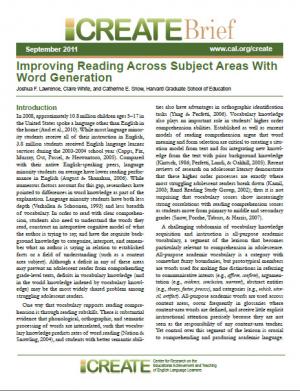Improving Reading Across Subject Areas with Word Generation

Using the evidence that reading comprehension supports vocabulary development and that vocabulary development supports reading comprehension, the authors describe the relationship between these two processes as one of reciprocal causation. It has been widely noted that less able students are likely to fall farther and farther behind if they struggle with learning processes linked by reciprocal causation. Fortunately, there is evidence that vocabulary instruction can have an important and lasting impact on student word learning. There is reason to think, then, that a robust vocabulary intervention that targets academic language may improve vocabulary and reading comprehension in the short run while also supporting the struggling reader's facility at learning new words independently. To study this further, the authors have conducted a quasi–experiment to assess the effectiveness of the "Word Generation Program," an intervention firmly grounded in what is currently known about effective practice, while also casting light on how enhanced vocabulary levels relate to improved reading comprehension. To this end, the research team compared the academic word–learning of schools that chose to implement the program versus schools that chose not to.
Citation
Lawrence, J.F., White, C., Snow, C.E. (2011.) "Improving Reading Across Subject Areas with Word Generation." Center for Research on Educational Achievement and Teaching of English Language Learners. Retrieved from: http://www.cal.org/create/resources/pubs/pdfs/improving-reading-across-subject-areas-with-word-generation.pdf
